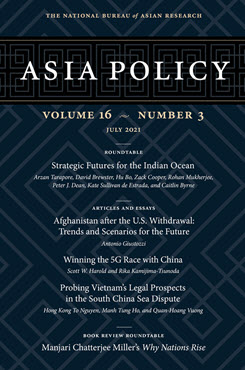Afghanistan after the U.S. Withdrawal
Trends and Scenarios for the Future
This essay discusses the prospects for Afghanistan after the completion of the U.S. forces withdrawal and assesses that a relatively wide range of outcomes remain possible.
EXECUTIVE SUMMARY
MAIN ARGUMENT
Neither the Taliban’s leadership nor any of their regional sponsors aim for the re-establishment of a Taliban autocracy. However, the deadlock in intra-Afghan talks raises the possibility of that happening by default, especially if the Taliban gain such a military edge that a balanced negotiated outcome becomes impossible. A Taliban military campaign could increasingly weaken the Taliban’s willingness to make concessions, whether to the government of the Islamic Republic of Afghanistan or to individual factions of the political elite in Kabul. In that scenario, two outcomes are possible: a de facto Taliban autocracy, in which fragments of the old political elite could be co-opted in a marginal, window-dressing role; or state collapse, in which the Taliban would not be able to assert order over the chaos created by the defeat of the republic.
POLICY IMPLICATIONS
- Unblocking the intra-Afghan talks will be a top priority for Kabul’s elite officials, and arguably, if to a lesser extent, for the Biden administration too. While political (and possibly physical) survival is at stake for Kabul’s elite, the problem for the Biden administration is one of ending U.S. intervention with a somewhat positive outcome.
- Direct and unofficial talks between Taliban and elements of Kabul’s political elite, bypassing the Ghani administration, are likely to increase in intensity and seriousness, even if the distance between most of the political factions and the Taliban remains wide.
- At the same time, there is also likely to be an intensification of scheming to unseat Ghani and replace him with an interim government that is deemed to be more acceptable to the Taliban and better able to prevent the deterioration of the government’s hold on the country.
- Regional powers, already skeptical of the staying power of the Islamic Republic of Afghanistan, are likely to view both growing Taliban strength and the bickering among political factions in Kabul as additional reasons to distance themselves from the internationally recognized Afghan government and throw their weight behind either the Taliban or a political solution that circumvents the Ghani administration.
Antonio Giustozzi is a Visiting Professor at King’s College London and a Fellow at the Royal United Services Institute (United Kingdom). His research interests include Afghanistan, Pakistan, insurgencies, state security reform, and state-building. He is the author or editor of eleven books, the most recent being The Taliban at War (2019).
About Asia Policy
Asia Policy is a peer-reviewed scholarly journal presenting policy-relevant academic research on the Asia-Pacific that draws clear and concise conclusions useful to today’s policymakers. Asia Policy is published quarterly in January, April, July, and October and accepts submissions on a rolling basis. Learn more


